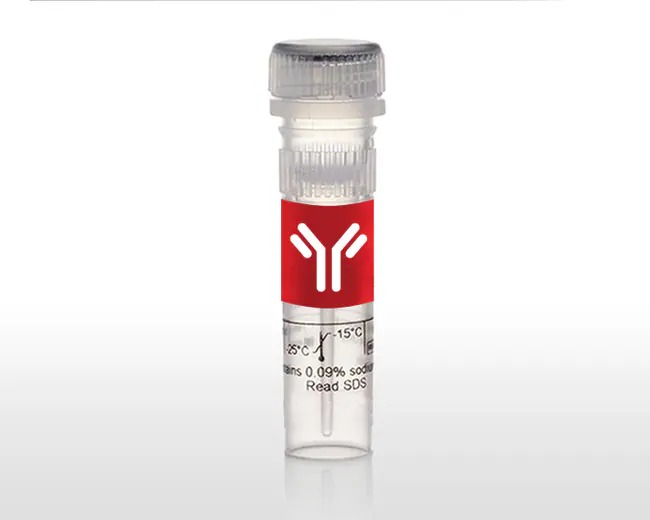Invitrogen™ Caspase 3 Recombinant Rabbit Monoclonal Antibody (9H19L2), 100 µg
Catalog No :
CAS Number :
Brand :
In Stock
Specifications:
| Application | Western Blot, immunocytochemistry, Immunohistochemistry, Immunoprecipitation (IP) | ||
| Storage Temperature | 2-8°C | ||
| Product Type | antibody | Forms | Liquid |
| Product Brand | Thermo Fisher Scientific™, Invitrogen | ||
| Product Grade | Molecular Biology | ||
The Invitrogen™ Caspase 3 Recombinant Rabbit Monoclonal Antibody (clone 9H19L2) is a highly specific, recombinant monoclonal antibody developed to detect Caspase 3 in human, mouse, and rat samples. Caspase 3 is a key protease involved in the execution phase of apoptosis (programmed cell death), making this antibody invaluable for studies on cell death, apoptosis, and neurodegenerative diseases.
This rabbit monoclonal antibody is optimized for use in Western blotting (WB), immunohistochemistry (IHC), immunocytochemistry (ICC/IF), and other immunoassays. Its high specificity and purity make it an ideal tool for detecting cleaved Caspase 3 as an apoptotic marker in cell culture and tissue samples.
Key Features:
-
High Specificity:
- This recombinant monoclonal antibody targets Caspase 3, specifically detecting cleaved Caspase 3 in apoptosis studies.
-
Versatile Applications:
- Suitable for Western Blotting (WB), Immunohistochemistry (IHC), Immunocytochemistry (ICC/IF), and Immunoprecipitation (IP), offering flexibility for various experimental setups.
-
Species Reactivity:
- Reactive to Human, Mouse, and Rat samples, with predicted reactivity to Bovine, Canine, Feline, Hamster, Rabbit, Pig, and Xenopus based on sequence homology.
-
Optimized Dilution:
- Western Blot (WB): 0.1-0.2 µg/mL
- Immunohistochemistry (IHC): 1:10-1:50
- Immunocytochemistry (ICC/IF): 1-2 µg/mL
- Immunoprecipitation (IP): 1:100-1:500
-
Purification:
- The antibody is purified using Protein A affinity chromatography, ensuring high purity and minimal non-specific binding.
-
Rabbit IgG Isotype:
- Produced in rabbit and IgG form for consistent, high-affinity binding and minimal cross-reactivity.
-
Easy Storage:
- Store at 4°C short-term or -20°C long-term, with 0.09% sodium azide as a preservative.
-
Ideal for Apoptosis Research:
- Perfect for studying apoptosis, cell death mechanisms, and Caspase 3 activation, especially in cancer, neurodegenerative diseases, and toxicology studies.
Specifications:
| Feature | Details |
|---|---|
| Clone | 9H19L2 |
| Host/Isotype | Rabbit IgG |
| Species Reactivity | Human, Mouse, Rat |
| Dilution Range | WB: 0.1-0.2 µg/mL, IHC: 1:10-1:50, ICC/IF: 1-2 µg/mL |
| Purification | Protein A affinity chromatography |
| Concentration | 0.5 mg/mL |
| Storage Buffer | PBS, 20% Glycerol, 1% BSA |
| Preservative | 0.09% Sodium Azide |
| Storage Conditions | 4°C short term, -20°C long term |
| Shipping Conditions | Wet Ice (international) |
| Catalog Number | 700182 |
| Quantity | 100 µg |
Applications:
-
Apoptosis Studies:
- Detect cleaved Caspase 3 in cell culture and tissue samples to study programmed cell death in various cellular models.
-
Western Blot (WB):
- Used for detection of cleaved Caspase 3 in protein lysates to analyze apoptotic cell death.
-
Immunohistochemistry (IHC):
- Detect Caspase 3 activation in tissue sections, providing insight into cellular apoptosis during disease progression.
-
Immunocytochemistry (ICC/IF):
- Used to visualize Caspase 3 cleavage in live or fixed cells under fluorescence microscopy, ideal for cellular studies.
-
Immunoprecipitation (IP):
- Caspase 3 antibody for protein-protein interaction studies in apoptosis pathways.
Positive Control:
- HeLa Cells, PC-12, Jurkat cells, treated with Cisplatin or other apoptotic inducers.
Target Information:
Caspase 3 (also known as Apopain or CPP32) is a cysteine-aspartic acid protease (caspase) involved in the execution phase of apoptosis. It cleaves and activates caspases 6, 7, and 9 and is the main protease responsible for the cleavage of amyloid-beta precursor protein in Alzheimer's disease.
The Invitrogen™ Caspase 3 Recombinant Rabbit Monoclonal Antibody (9H19L2) is an essential tool for apoptosis research, offering high specificity for Caspase 3 detection across multiple applications including Western blot, Immunohistochemistry, Immunocytochemistry, and Immunoprecipitation. With its high sensitivity and consistent performance, this antibody is invaluable for studying cell death mechanisms in cancer, neurodegenerative diseases, and drug testing.




 0
0
